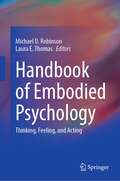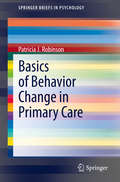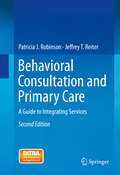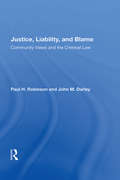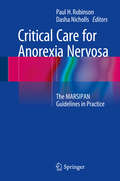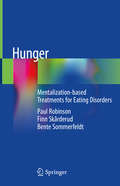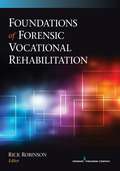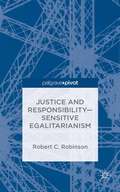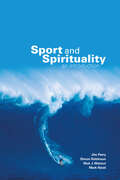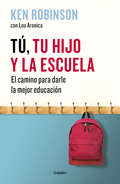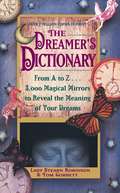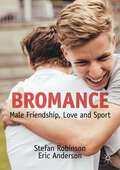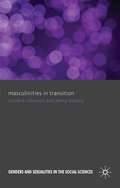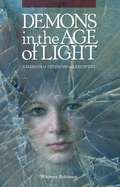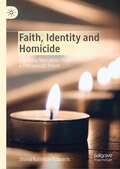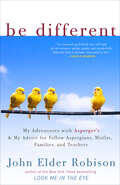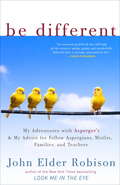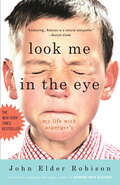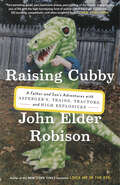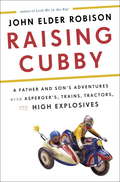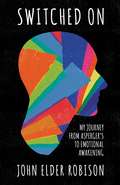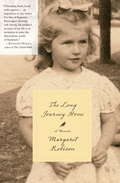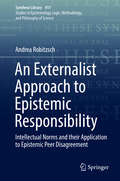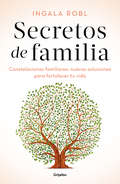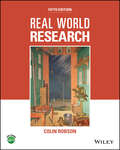- Table View
- List View
Handbook of Embodied Psychology: Thinking, Feeling, and Acting
by Michael D. Robinson Laura E. ThomasThis edited volume seeks to integrate research and scholarship on the topic of embodiment, with the idea being that thinking and feeling are often grounded in more concrete representations related to perception and action. The book centers on psychological approaches to embodiment and includes chapters speaking to development as well as clinical issues, though a larger number focus on topics related to cognition and neuroscience as well as social and personality psychology. These topical chapters are linked to theory-based chapters centered on interoception, grounded cognition, conceptual metaphor, and the extended mind thesis. Further, a concluding section speaks to critical issues such as replication concerns, alternative interpretations, and future directions. The final result is a carefully conceived product that is a comprehensive and well-integrated volume on the psychology of embodiment. The primary audience for this book is academic psychologists from many different areas of psychology (e.g., social, developmental, cognitive, clinical). The secondary audience consists of disciplines in which ideas related to embodied cognition figure prominently, such as counseling, education, biology, and philosophy.
Basics of Behavior Change in Primary Care (SpringerBriefs in Psychology)
by Patricia J. RobinsonEmerging policy changes are encouraging adoption of a team-based approach to healthcare, yet most healthcare professionals receive little training in how to practice integrated care. Basics of Behavioral Health in Primary Care is a playbook for mental health and medical professionals to share in addressing behavioral health concerns in primary care. Concise and practical, this clinically-focused book addresses the needs of a diverse group of healthcare providers, as well as students preparing for careers in the rapidly changing landscape of healthcare.
Behavioral Consultation and Primary Care: A Guide to Integrating Services
by Patricia J. Robinson Jeffrey T. Reiter"In this 2nd edition, Robinson and Reiter give us an updated blueprint for full integration of behavioral health and primary care in practice. They review the compelling rationale, but their real contribution is telling us exactly HOW to think about it and how to do it. This latest book is a must for anyone interested in population health and the nuts and bolts of full integration through using the Primary Care Behavioral Health Consultation model. " Susan H McDaniel Ph. D. , 2016 President, American Psychological Association Professor, University of Rochester Medical Center The best-selling guide to integrating behavioral health services into primary care is now updated, expanded and better than ever! Integration is exploding in growth, and it is moving inexorably toward the model outlined here. To keep pace, this revised text is a must for primary care clinicians and administrators. It is also essential reading for graduate classes in a variety of disciplines, including social work, psychology, and medicine. This updated edition includes: · A refined presentation of the Primary Care Behavioral Health (PCBH) model · The latest terms, trends and innovations in primary care · Comprehensive strategies and resource lists for hiring and training new Behavioral Health Consultants (BHC) · Step-by-step guidance for implementing the PCBH model · A plethora of evolved practice tools, including new Core Competency Tools for BHCs and primary care providers · Sample interventions for behaviorally influenced problems · The use of "Third Wave" behavior therapies in primary care · Detailed program evaluation instructions and tools · The latest on financing integrated care · An entire chapter on understanding and addressing the prescription drug abuse epidemic · Experienced guidance on ethical issues in the PCBH model · Improved patient education handouts With all of the changes in health care, the potential for the Primary Care Behavioral Health (PCBH) model to improve primary care--and the health of the population--is greater than ever. This book should be the first read for anyone interested in realizing the potential of integration.
Justice, Liability, And Blame: Community Views And The Criminal Law
by Paul H. RobinsonThis book examines shared intuitive notions of justice among laypersons and compares the discovered principles to those instantiated in American criminal codes. It reports eighteen original studies on a wide range of issues that are central to criminal law formulation.
Critical Care for Anorexia Nervosa: The MARSIPAN Guidelines in Practice
by Paul H. Robinson Dasha NichollsThis book focuses on the role of the psychiatric, medical, nutritional and psychiatric assessment and management of severely ill patients with anorexia nervosa. Leading clinicians and researchers address the essentials of risk assessment, the identification of complications and the monitoring of treatment progress. Location of care and the role of the team are fully addressed, with due consideration of legal and ethical issues. Practical guidelines are included on risk assessment, management of acute and chronic physical problems, feeding during treatment and consent, as outlined in the MARSIPAN (2010) and Junior MARSIPAN (2012) documents. Critical Care for Anorexia Nervosa will be of value for medical and paediatric teams, GPs, psychiatrists and all health-care professionals involved in the treatment of acutely ill patients with anorexia nervosa.
Hunger: Mentalization-based Treatments For Eating Disorders
by Paul Robinson Finn Skårderud Bente SommerfeldtThis work presents the adaptation of mentalization-based therapy for use in Eating Disorders (MBT-ED). The book starts with a presentation of the theoretical concept of mentalization and describes eating disorders from this perspective. This is followed by a discussion of the place of MBT-ED in eating disorders practice. MBT is first presented as the original model for borderline personality disorder, and then the model is further developed to address specific symptoms found in eating disorders, such as body image disturbance, restriction and purging. The original MBT model consists of outpatient treatment combined with individual and group psychotherapy, and psychoeducation in groups. The book then looks at supervision and training, and how an eating disorders team can develop a mentalizing focus. It goes on to describe the training required for practitioners to deliver individual and group MBT-ED and to supervise therapy. Lastly, it examines the implementation of the approach in different clinical settings, including inpatient services, and how management can be involved in negotiating barriers and taking advantage of enablers in the system. The authors have conducted a pilot randomized controlled trial and qualitative research in MBT-ED and have extensive experience in providing and supervising this novel therapy. MBT-ED is one of the few therapies for eating disorders that links theory of mind, and attachment and psychodynamic therapies and as such will be of great theoretical interest to a wide variety of clinicians and researchers.
The Foundations Of Forensic Vocational Rehabilitation
by Rick RobinsonThis is the first fundamental text to focus specifically on forensic vocational rehabilitation, a field that is forecast to grow rapidly. Forensic vocational rehabilitation consultants evaluate the vocational and rehabilitation needs of individuals in an array of legal settings such as civil litigation, workersí compensation, Social Security disability, and others. The text is unique in its exploration of the vocational rehabilitation process from a biopsychosocial perspective that views disability as a complex and multidimensional construct. The book comprehensively describes the parameters and theoretical issues of relevance in evaluating and developing opinions in forensically oriented matters. It culls and synthesizes current peer-reviewed literature and research on this private subspecialty practice area of rehabilitation counseling, including theories, models, methods, procedures, and fundamental tenets of the field. Also included is current information about the labor market, life care planning, and professional identity, standards, and ethics.
Justice and Responsibility— Sensitive Egalitarianism
by Robert C. RobinsonThis text explores the place to locate the cut between those inequalities for which it is fair to hold one responsible, and those for which it is not. The argument traces a thread of intellectual history, identifying a rejection of strong property rights which we inherit from Locke, and find in contemporary defenders of entitlements such as Nozick.
Sport and Spirituality: An Introduction
by Simon Robinson Nick Watson Jim Parry Mark NestiSport science can quantify many aspects of human performance but the spiritual dimensions of sports experience cannot be fully understood through measurement. However, the spiritual experience of sport – be it described as ‘flow’, ‘transcendence’ or the discovery of meaning and value – is central both to our basic motivation to take part in sports, and to achieving success. Sport and Spirituality: An Introduction explores these human aspects of sports experience through the perspectives of sport psychology, philosophy, ethics, theology and religious studies. It includes discussions of: Spirituality in the postmodern era Spirituality, health and well-being Theistic and atheistic perspectives on sport and the spiritual Nature and transcendence – the mystical and sublime in outdoor sport Applied sport psychology and the existential Spiritual perspectives on pain, suffering and destiny Sport, the virtues, ethical development and the spirit of the game The Olympic Games and de Coubertin’s ideas of the ‘religio athletae’. This groundbreaking text will be a valuable resource for students of sport and exercise studies, sports coaching, physical education and sport and health psychology. This book should be read by all those interested in the preparation, performance and well-being of athletes.
Tú, tu hijo y la escuela: El camino para darle la mejor educación
by Sir Ken RobinsonUn libro esencial que orientará a los padres sobre cómo proporcionar a sus hijos la mejor educación para alcanzar una vida plena y feliz. Los padres de hoy en día se encuentran profundamente perdidos en relación a la educación que deben proporcionar a sus hijos, especialmente en un momento en el que todo está muy dominado por la polémica y la política. Sir Ken Robinson, uno de los mayores expertos mundiales en la materia, ha mantenido conversaciones con centenares de padres en las que le han expresado los dilemas y las dudas a los que se enfrentan cuando se plantean la educación de sus hijos: ¿Qué es lo que deberían priorizar?, ¿Cómo pueden saber si una determinada escuela es la más apropiada para sus hijos y, si no lo es, qué pueden hacer para remediarlo? Tú, tu hijo y la escuela es un libro indispensable en el que Sir Ken Robinson plantea principios básicos y aporta consejos prácticos para que los padres puedan apoyar a sus hijos a lo largo del recorrido escolar o incluso fuera de él si deciden seguir una escolarización en casa.
Dreamer's Dictionary
by Stearn Robinson Tom CorbettWith over over 1 million copies sold, this "admirable" dictionary is the result of years of research, packaged in an easy-to-use guide telling you how to distinguish the four types of dreams, identify dream symbols, and understand meanings (New York Times).Dreams--they belong to our most intimate experiences. In dreams, our memories, the events of the day, and our fears and expectations for the future mingle in strange and baffling ways to challenge our understanding. Now this amazingly complete, alphabetically arranged bedside reference--the result of years of meticulous research through ancient and modern sources--offers clear, authoritative, and instant insight into the astonishing meaning of your dreams.Did you dream : Flowers?... If they were fresh, expect a happy occasion.Driving?... If you were at the wheel, watch your wallet!Movies?... If you didn't like the show, beware of insincere friends.Soap?... If it was scented, you'll find happiness in love.
Bromance: Male Friendship, Love and Sport
by Stefan Robinson Eric AndersonUnraveling the stereotype that men’s friendships are unemotional and shallow, this book provides the first detailed account of the bromance that exists among young men. Drawing on one year of ethnography and 20 in-depth interviews among a university sport team, the authors show that these men reject traditional masculine boundaries, instead prioritizing an emotional and tactile form of friendship. Chapters detail the cultural shift in society’s views on bromances, showing that bromances exists as an elevated, more emotional and intimate form of friendship, existing as a further positive consequence of decreasing cultural homophobia. By focusing on sport—which has traditionally been seen as a homophobic environment with toxic constructions of manhood—the authors show that even in the most traditionally masculine of settings, young men are rethinking what male friendship looks like, what it means to be a man, and the positive impact this can have on their mental health. This book will be relevant to a number of audiences including scholars and students in masculinity studies, queer studies, and friendship studies; LGBTQ+ activists and allies with interest in straight men’s friendships and sports cultures; and men’s mental health advocates.
Masculinities in Transition
by Victoria Robinson Jenny HockeyContributing to feminist approaches to masculinities, this book examines men's contextual experiences of masculine identity. Drawing on new data which compares men as they move across and between public and domestic spaces, it explores the implications of this for the nature of contemporary masculinity.
Demons in the Age of Light
by Whitney RobinsonWith the skill of a gifted novelist, twenty-three-year-old Whitney Robinson recounts the harrowing true story of her descent into mental illness soon after she arrived at college. Her doctor labeled the illness schizophrenia, but Whitney felt that she became possessed by a malevolent, seductive entity that attempted to influence her into harming herself and others. Institutionalized and heavily medicated, Whitney encounters other horrors and mysteries within the walls of a psychiatric hospital. Determined to release herself from pharmacological shackles, Whitney finally confronts and expels her demon through sheer will and alternative methods, including an attempted exorcism and shamanic healing. Whitney's saga parallels current discussions in the media regarding American psychiatry's dependence on drug-based treatments and the renewed interest in alternative healing methods of eastern and indigenous cultures, which, according to a recent New York Times article "The Americanization of Mental Illness," have been revealed to be at least as effective as pharmaceutically driven treatments. Whitney's story of survival and personal growth will serve as a living model for others on radio and television programs.
Faith, Identity and Homicide: Exploring Narratives from a Therapeutic Prison
by Shona Robinson-EdwardsThis book explores the role that religion plays in the lives of imprisoned homicide offenders. Drawing on interviews in an English prison, the author examines how they narrate their life stories and how religion intersects with other categories to rebuild their personal identities after committing a crime and being labelled as murderers or killers. This book seeks to bridge the gap between macro and micro phenomena, examining religion as both a social institution and a personal experience. It also explores the mediating role of institutions with regards to the nature and extent of their influence upon individual choices and actions, and provides insights into the nature of the therapeutic prison. It seeks to create some clarity of understanding the complex nature of religiosity, narrative, identity, desistance and rehabilitation whilst critically examining elements of social identity that may restrict or enhance this process. It provides a series of recommendations for organisations working with convicted homicide offenders/offenders and speaks to academics and practitioners in the fields of criminology, sociology, psychology and religious/theological studies.
Be Different: Adventures of a Free-Range Aspergian with Practical Advice for Aspergians, Misfits, Families & Teachers
by John Elder Robison"I believe those of us with Asperger's are here for a reason, and we have much to offer. This book will help you bring out those gifts." In his bestselling memoir, Look Me in the Eye, John Elder Robison described growing up with Asperger's syndrome at a time when the diagnosis didn't exist. He was intelligent but socially isolated; his talents won him jobs with toy makers and rock bands but did little to endear him to authority figures and classmates, who were put off by his inclination to blurt out non sequiturs and avoid eye contact.By the time he was diagnosed at age forty, John had already developed a myriad of coping strategies that helped him achieve a seemingly normal, even highly successful, life. In Be Different, Robison shares a new batch of endearing storiesabout his childhood, adolescence, and young adult years, giving the reader a rare window into the Aspergian mind.In each story, he offers practical advice--for Aspergians and indeed for anyone who feels "different"--on how to improve the weak communication and social skills that keep so many people from taking full advantage of their often remarkable gifts. With his trademark honesty and unapologetic eccentricity, Robison addresses questions like:* How to read others and follow their behaviors when in uncertain social situations* Why manners matter* How to harness your powers of concentration to master difficult skills* How to deal with bullies* When to make an effort to fit in, and when to embrace eccentricity* How to identify special gifts and use them to your advantageEvery person, Aspergian or not, has something unique to offer the world, and every person has the capacity to create strong, loving bonds with their friends and family. Be Different will help readers and those they love find their path to success.
Be Different: Adventures of a Free-range Aspergian
by John Elder Robison"I believe those of us with Asperger's are here for a reason, and we have much to offer. This book will help you bring out those gifts." In his bestselling memoir, Look Me in the Eye, John Elder Robison described growing up with Asperger's syndrome at a time when the diagnosis didn't exist. He was intelligent but socially isolated; his talents won him jobs with toy makers and rock bands but did little to endear him to authority figures and classmates, who were put off by his inclination to blurt out non sequiturs and avoid eye contact. By the time he was diagnosed at age forty, John had already developed a myriad of coping strategies that helped him achieve a seemingly normal, even highly successful, life. In Be Different, Robison shares a new batch of endearing stories about his childhood, adolescence, and young adult years, giving the reader a rare window into the Aspergian mind.In each story, he offers practical advice--for Aspergians and indeed for anyone who feels "different"--on how to improve the weak communication and social skills that keep so many people from taking full advantage of their often remarkable gifts. With his trademark honesty and unapologetic eccentricity, Robison addresses questions like: * How to read others and follow their behaviors when in uncertain social situations * Why manners matter * How to harness your powers of concentration to master difficult skills * How to deal with bullies * When to make an effort to fit in, and when to embrace eccentricity * How to identify special gifts and use them to your advantage. Every person, Aspergian or not, has something unique to offer the world, and every person has the capacity to create strong, loving bonds with their friends and family. Be Different will help readers and those they love find their path to success.
Look Me in the Eye: My Life with Asperger's (Thorndike Biography Ser.)
by John Elder RobisonEver since he was young, John Robison longed to connect with other people, but by the time he was a teenager, his odd habits—an inclination to blurt out non sequiturs, avoid eye contact, dismantle radios, and dig five-foot holes (and stick his younger brother, Augusten Burroughs, in them)—had earned him the label “social deviant.” It was not until he was forty that he was diagnosed with a form of autism called Asperger’s syndrome. That understanding transformed the way he saw himself—and the world. A born storyteller, Robison has written a moving, darkly funny memoir about a life that has taken him from developing exploding guitars for KISS to building a family of his own. It’s a strange, sly, indelible account—sometimes alien yet always deeply human.
Raising Cubby: A Father and Son's Adventures with Asperger's, Trains, Tractors, and High Explosives
by John Elder RobisonThe slyly funny, sweetly moving memoir of an unconventional dad's relationship with his equally offbeat son--complete with fast cars, tall tales, homemade explosives, and a whole lot of fun and trouble John Robison was not your typical dad. Diagnosed with Asperger's syndrome at the age of forty, he approached fatherhood as a series of logic puzzles and practical jokes. Instead of a speech about the birds and the bees, he told his son, Cubby, that he'd bought him at the Kid Store--and that the salesman had cheated him by promising Cubby would "do all chores." While other parents played catch with their kids, John taught Cubby to drive the family's antique Rolls-Royce. Still, Cubby seemed to be turning out pretty well, at least until school authorities decided that he was dumb and stubborn--the very same thing John had been told as a child. Did Cubby have Asperger's too? The answer was unclear. One thing was clear, though: By the time he turned seventeen, Cubby had become a brilliant and curious chemist--smart enough to make military-grade explosives and bring federal agents calling. With Cubby facing a felony trial--and up to sixty years in prison--both father and son were forced to take stock of their lives, finally accepting that being "on the spectrum" is both a challenge and a unique gift.nd a bracing lack of sentimentality." --Entertainment Weekly"Endearing...Robison is a natural storyteller." --Boston Globe
Raising Cubby
by John Elder RobisonThe slyly funny, sweetly moving memoir of an unconventional dad's relationship with his equally offbeat son--complete with fast cars, tall tales, homemade explosives, and a whole lot of fun and trouble Misfit, truant, delinquent. John Robison was never a model child, and he wasn't a model dad either. Diagnosed with Asperger's syndrome at the age of forty, he approached fatherhood as a series of logic puzzles and practical jokes. When his son, Cubby, asked, "Where did I come from?" John said he'd bought him at the Kid Store and that the salesman had cheated him by promising Cubby would "do all chores." He read electrical engineering manuals to Cubby at bedtime. He told Cubby that wizards turned children into stone when they misbehaved. Still, John got the basics right. He made sure Cubby never drank diesel fuel at the automobile repair shop he owns. And he gave him a life of adventure: By the time Cubby was ten, he'd steered a Coast Guard cutter, driven a freight locomotive, and run an antique Rolls Royce into a fence. The one thing John couldn't figure out was what to do when school authorities decided that Cubby was dumb and stubborn--the very same thing he had been told as a child. Did Cubby have Asperger's too? The answer was unclear. One thing was clear, though: By the time he turned seventeen, Cubby had become a brilliant chemist--smart enough to make military-grade explosives and bring state and federal agents calling. Afterward, with Cubby facing up to sixty years in prison, both father and son were forced to take stock of their lives, finally coming to terms with being "on the spectrum" as both a challenge and a unique gift. By turns tender, suspenseful, and hilarious, this is more than just the story of raising Cubby. It's the story of a father and son who grow up together. Praise for John Robison's first book, Look Me In the Eye:"Lean, powerful in its descriptive accuracy and engaging in its understated humor...Emotionally gripping." --Chicago Tribune"A fantastic life story told with grace, humor, and a bracing lack of sentimentality." --Entertainment Weekly"Endearing...Robison is a natural storyteller." --Boston Globe
Switched On: From Asperger's to Emotional Awakening
by John Elder Robison"For the first time in my life, I learned what it was really like to truly "know" other people's feelings. At a stroke I went from oblivious to insightful, and my life was forever changed. It was as if I'd been experiencing the world in black and white all my life, and suddenly I could see everything - and particularly other people - in brilliant beautiful color."Six years ago, John Elder Robison published Look Me In the Eye, his memoir about growing up with Asperger's. Now he tells the remarkable story of how he met Dr Alvaro Pascual-Leone, a Harvard neuroscientist who proposed that John's emotional intelligence wasn't so much absent as it was dormant, and that by animating the appropriate neural pathways with powerful electromagnets he might be able to awaken this part of his brain. So began a five-and-a-half year journey in which John gave himself up as a guinea pig to some of the world's top brain researchers in an effort to understand and fix the deficits of emotional intelligence that lie at the heart of autism.John experiences the benefits and pitfalls, the joy and melancholy, of being able to feel in response to things that happen to him and his loved ones. A real-life Flowers For Algernon with a happy ending, Switched On goes on the trail of the revolutionary science that has the potential to transform millions of emotionally circumscribed lives.
The Long Journey Home: A Memoir
by Margaret RobisonFirst introduced to the world in her sons’ now-classic memoirs—Augusten Burroughs’s Running with Scissors and John Elder Robison’s Look Me in the Eye—Margaret Robison now tells her own haunting and lyrical story. A poet and teacher by profession, Robison describes her Southern Gothic childhood, her marriage to a handsome, brilliant man who became a split-personality alcoholic and abusive husband, the challenges she faced raising two children while having psychotic breakdowns of her own, and her struggle to regain her sanity. Robison grew up in southern Georgia, where the façade of 1950s propriety masked all sorts of demons, including alcoholism, misogyny, repressed homosexuality, and suicide. She met her husband, John Robison, in college, and together they moved up north, where John embarked upon a successful academic career and Margaret brought up the children and worked on her art and poetry. Yet her husband’s alcoholism and her collapse into psychosis, and the eventual disintegration of their marriage, took a tremendous toll on their family: Her older son, John Elder, moved out of the house when he was a teenager, and her younger son, Chris (who later renamed himself Augusten), never completed high school. When Margaret met Dr. Rodolph Turcotte, the therapist who was treating her husband, she felt understood for the first time and quickly fell under his idiosyncratic and, eventually, harmful influence. Robison writes movingly and honestly about her mental illness, her shortcomings as a parent, her difficult marriage, her traumatic relationship with Dr. Turcotte, and her two now-famous children, Augusten Burroughs and John Elder Robison, who have each written bestselling memoirs about their family. She also writes inspiringly about her hard-earned journey to sanity and clarity. An astonishing and enduring story, The Long Journey Home is a remarkable and ultimately uplifting account of a complicated, afflicted twentieth-century family.From the Hardcover edition.
An Externalist Approach to Epistemic Responsibility: Intellectual Norms and their Application to Epistemic Peer Disagreement (Synthese Library #411)
by Andrea RobitzschThis monograph provides a novel reliabilist approach to epistemic responsibility assessment. The author presents unique arguments for the epistemic significance of belief-influencing actions and omissions. She grounds her proposal in indirect doxastic control.The book consists of four chapters. The first two chapters look at the different ways in which an agent might control the revision, retention, or rejection of her beliefs. They provide a systematic overview of the different approaches to doxastic control and contain a thorough study of reasons-responsive approaches to direct and indirect doxastic control.The third chapter provides a reliabilist approach to epistemic responsibility assessment which is based on indirect doxastic control.In the fourth chapter, the author examines epistemic peer disagreement and applies her reliabilist approach to epistemic responsibility assessment to this debate. She argues that the epistemic significance of peer disagreement does not only rely on the way in which an agent should revise her belief in the face of disagreement, it also relies on the way in which an agent should act.This book deals with questions of meliorative epistemology in general and with questions concerning doxastic responsibility and epistemic responsibility assessment in particular. It will appeal to graduate students and researchers with an interest in epistemology.
Secretos de familia
by Ingala RoblSiempre ha habido excluidos y siempre ha habido secretos en las familias. ¿Qué ocasionan estos actos y silencios? ¿Cómo se traducen en las relaciones personales? ¿Por qué a veces repetimos patrones y no entendemos de dónde vienen? ¿Cómo reordenar el sistema familiar para sanar? Las constelaciones familiares son un instrumento de diagnóstico altamente eficaz que proporciona una respuesta objetiva a este tipo de cuestionamientos. Mediante las constelaciones, lo que se consideraba "malo", como la enfermedad, la soledad, la tragedia o la muerte, cobra un nuevo significado y una fuerza potencial que restituye el sentido de la vida; asimismo, podemos desmitificar el dolor, reconocerlo como gran aliado, y respetar los errores y la historia de nuestros ancestros para hacer algo mejor. Por ello, en este libro actualizado, Ingala Robl (la especialista número uno en Constelaciones familiares en toda América Latina y discípula directa del creador de este método) nos presenta una extraordinaria herramienta para observar, reconocer, aceptar y honrar lo que nos ha tocado, soltar aquello que no nos corresponde y asumir con humildad que hay una fuerza superior, una gran alma que nos une a nuestros antepasados y nos guía para contemplar y vivir la vida, permitiendo que fluya hacia donde tiene que fluir: hacia un destino más allá de nuestra limitada comprensión individual.
Real World Research
by Colin RobsonREAL WORLD RESEARCH Provides students and practitioner alike with clear and systematic guidance on performing social research in applied settings Real World Research supplies the multidisciplinary skills necessary to conduct social research projects inside and outside of the classroom or the workplace. Offering well-balanced coverage of qualitative, quantitative, and mixed methods, this highly practical resource incorporates approaches from different social science disciplines to help readers find answers to real-life research questions in healthcare, education, business and management, and in many other public and private settings. Detailed yet accessible chapters include step-by-step advice for developing a research question, choosing a research design strategy, collecting and analyzing the data, interpreting and reporting the results, and more. The fifth edition contains timely coverage of contemporary methodologies, key ethical issues, and ongoing debates within the field of social research. New and expanded sections address topics such as evidence‐based approaches to social research, ethical considerations when conducting research involving people, carrying out projects based solely on existing research, and the importance and implications of internet-based research. Featuring a wealth of up-to-date examples drawn from a wide range of disciplines, this classic textbook: Focuses on useful real-world research in applied settings such as homes, schools, businesses, and other workplaces Provides a concise overview and a well-defined example of each main step of the research process Highlights the importance of collaboration, cooperation, and active participation in social research Explains flexible research designs using largely qualitative methods, including additional coverage of ethnographic and grounded theory approaches Includes an extensive companion website with numerous research examples, links to journal articles, PowerPoint slides, and many other additional resources Real World Research, Fifth Edition, remains essential reading for those tasked with developing, performing, and reporting the findings of a research project, including students, academics and educators, social scientists, health practitioners, and professionals in a diverse range of fields.
